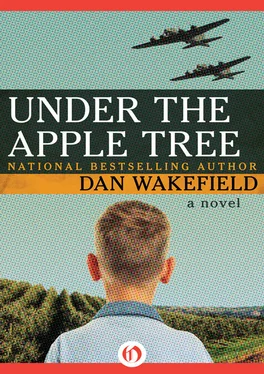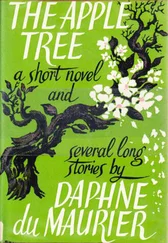“That’s the second-floor room at the front, with the nice view of Hempstead’s silo?”
“Yes, and I think he appreciates it. I think that boy has an eye for beauty.”
“I bet. You still doing baby-sitting these days?”
“Oh, yes, I’m sitting the Buskerman boy tonight. Little Franklin? He’s a real scamp. Can’t sit still for a story. More like that brother of yours than you. How is Roy, anyway?”
“Oh, he’s super, Miss Winger. Mowing down Japs over there on Eniwetok.”
“To think of it. All those nice boys.”
“Well, I got to shake a leg, Miss Winger, but thanks a lot for the oatmeal cookies.”
“Take some with you. And don’t be such a stranger!”
“Cross my heart and hope to die,” said Artie, and hurried out with a handful of cookies.
He kept his promise to return much sooner than Miss Winger would have dreamed, but he hoped she would never find out. While she was over baby-sitting little Franklin Buskerman, and Clarence Foltz was busy ushering at the Strand, Artie slipped back to the Boardinghouse, saw there were no lights on except in the living room, where Miss Winger always kept a light going even when no one was there. Artie knew the door to the house was never locked and the roomers didn’t have locks on the doors of their rooms.
He didn’t turn on the light when he got inside Clarence Foltz’s room, so no one would discover him, but used his trusty penlight. The first thing he noticed were the books. They were everywhere: on the desk, beside the bed, on the bed, under the bed, stacked in the corner. They were spread across the room in piles and pairs and alone, randomly, like a scattering of leaves: brown, yellow, black, green, red. Being a good counterspy, Artie avoided the obvious, and opened the main drawer of the desk. There too was a book. He picked it up, shining the penlight on it. Holy Toledo! Talk about a clue!
The book was Guadalcanal Diary . Artie flipped through it, noticing immediately how many parts were underlined in red pencil. It was obvious Foltz was a fraud; he had never even been to Guadalcanal, and he got all his info out of the book about it! Artie slipped it back in the drawer, and quickly scanned the books on the desk. Most of them were thin, and he didn’t recognize the titles. He picked one up and read it. There were poems inside. He tried to read one, but he couldn’t figure it out. He turned to another called “The Waste Land,” which he figured must be about the War, like the way a country was after a battle. He turned to the end of it to see how it came out, and which side had won. There were strange, mysterious words he had never seen or heard:
Datta. Dayadhvam. Damyata.
Shantih shantih shantih.
Artie tried to mouth the sounds to himself, but none of it made sense. Then he slapped his hand to his head.
Of course! The book was in code . That was the only sensible explanation.
Artie crept back to the door, satisfied beyond the shadow of a doubt that Foltz was a German spy.
Tutlow was wearing sunglasses.
March had “come in like a lamb” this year, and the days were kind of warmish and breezy, but it sure wasn’t any weather for sunglasses yet.
“What you got those on for?” Artie asked. “It’s not even summer.”
“We’re going to tail a man, aren’t we?”
“I doubt he’s going all the way to Florida.”
“Don’t be a sap,” said Tutlow. “You tail a man, you don’t want to be identified, do you?”
“Everyone in Town will identify a guy wearing sunglasses in March,” Artie said. “They’ll think you’re cuckoo.”
“Doesn’t matter what other people think. The idea is not to get identified by the man you’re tailing . Then he can’t accurately identify you later.”
“You’re trying to be like in the movies is all you’re doing.”
Tutlow whipped off the sunglasses and glared at Artie.
“You want me to do this job alone?”
“It’s my job!” Artie said. “I’m the one discovered the guy. I just invited you.”
“Invited,” said Tutlow scornfully. “This is no tea party, Garber.”
Tutlow put the sunglasses back on. Artie thought they made him look blind, but he decided not to mention it.
They walked out to the Hempstead Farm in silence, to wait for Clarence Foltz to take his mysterious daily walk during which he disappeared for several hours every afternoon.
Foltz came out in an old leather jacket that reminded Artie of the kind German flyers wore. He headed for Main Street, and after he had gone about the length of a football field, Artie started to get up out of the weeds and start tailing, but Tutlow pulled him back down.
“You got to give him enough of a lead so he doesn’t look back and see you,” he explained.
“If he can’t look back and see us , then how the heck can we see him? ”
“I mean see us good enough to identify us.”
“I thought he’d never identify you anyway cause of those corny sunglasses,” Artie said.
Tutlow pretended he didn’t hear that, and instead of saying anything he just got up, pulled the collar of his coat around his neck, shoved his hands deep in his pants pockets, and started trailing.
“Some guys think they’re Humphrey Bogart or somebody,” Artie said under his breath, but he just went along and followed Tutlow; there wasn’t time now to mess around.
Artie’s strategy was to try and just look natural, especially when they were walking down Main Street. People kept staring at Tutlow in his wacky sunglasses and his counterspy walk, so Artie made a point of being real casual, swinging his arms and whistling “Deep in the Heart of Texas,” like there wasn’t even a War on.
Just then the last person in the world Artie wanted to run into came ambling out of Damon’s Drugs, right in front of him and Tutlow.
Caroline stopped and looked at them with a little smile, like she was highly amused.
“What do we have here?” she asked. “The Rover Boys?”
She was using this new kind of perfume that drowned out the smell of her Mild Camay Beauty Soap and reminded Artie of something Yvonne DeCarlo would wear in her harem.
“Sorry I can’t shoot the breeze,” Artie said. “We got business.”
“What are you going to do,” she asked, “hold up the First Federal?”
Tutlow shot her a corny comeback out of the side of his mouth.
“Take a powder,” he said.
Caroline threw back her lovely head, the shining hair swinging in the sunlight, and laughed like Bette Davis in Now, Voyager .
Artie slunk on beside Tutlow, feeling like the worst kind of worm. He took deep breaths of air, trying to get Caroline’s harem perfume out of his head, as they followed their man clear out of Town.
When they got to the edge of the woods by Skinner Creek, where Foltz had disappeared down the path into the trees, Artie stopped.
“Come on!” said Tutlow. “We’re hot on his trail.”
“I dunno,” Artie said.
“Don’t know !” Tutlow said in a hiss of rage. “You turning yellow on me?”
Artie supposed he was being really weird, but he had this funny feeling in the pit of his stomach. He knew he wasn’t yellow, he knew he wasn’t even afraid of risking his life for his country, but he still had this odd feeling, like something telling him not to go on any further. He couldn’t explain it, though.
“There’s nothing to sabotage at Skinner Creek,” he said feebly. “Maybe he’s just getting his exercise. They got to keep in shape, spies; it’s not just all glory.”
“You nit! He might be out to rendezvous with a paratrooper and help him hide the chute. You think the Nazis just parachute guys onto Main Street in broad daylight? Spies hide out in the woods, they make their plans in the woods, they keep their maps and ex plo sives in the woods.”
Читать дальше












